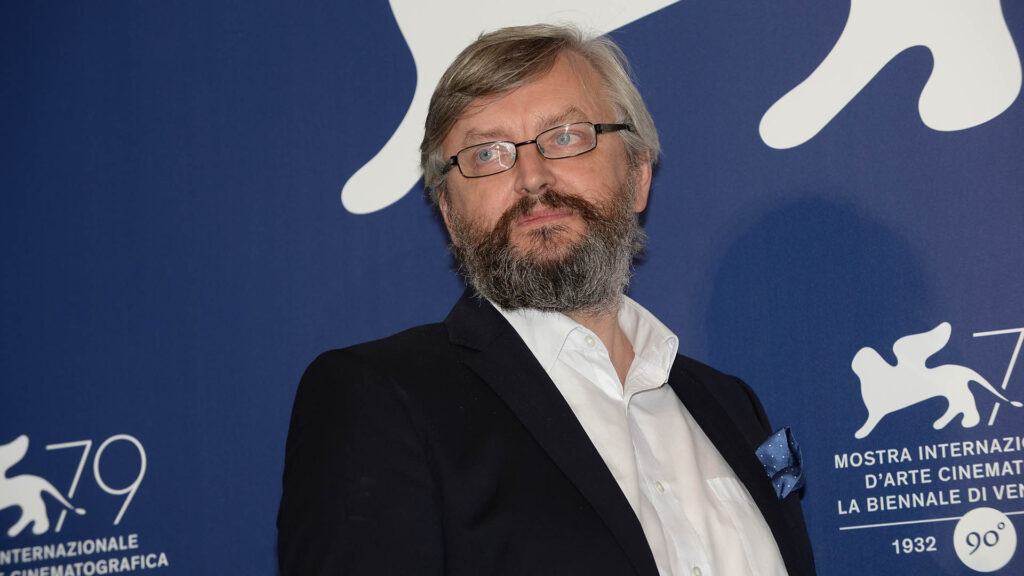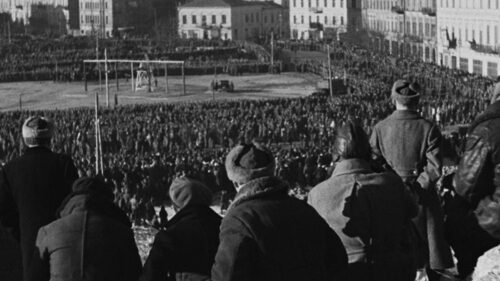
The Kiev Trial reconstructs one of the twenty public trials against Nazi criminals that were held in the Soviet Union in the aftermath of World War II. Why did you find it urgent to relate this episode now?
I found this footage back when I was working on a previous film of mine for the Babi Yar Holocaust Memorial Centre: Babi Yar. Context, which is also about a similar historical trial. I was surprised to find footage of the trial, barely anyone knew it even existed! Historians who study, research, and specialize on this piece of history didn’t know. I think this is a very important moment in the history of Ukraine, and the history of Kiev in particular. I petitioned the Memorial Centre to support us in financing this film, which they agreed to, and making this film was made possible.
It may be of great interest to those who are going to watch your documentary to know the timeline of the making of the film in relation to the Russian attack on Ukraine. When did you start working on The Kiev Trial? Were there any changes in the making of the film dictated by current tragic events?
I worked on this film in 2021, and the film was completed last January. We all know what happened next. I may say I could have predicted, but I would have never imagined it would happen at such a scale. I would not have imagined such a cruel, violent war, or that Russians would destroy cities and kill people. We had a kind of déjà-vu with this invasion, only now, Russia played the part that used to be Germany’s – the aggressor. I would not have made any changes, and the film was completed anyway. We mixed sound, colour gradients, this kind of things… but the film has its own logic and it developed according to this logic. I did try to represent a different group of people who participated in this story and who could give evidence of what happened. I tried to act like a historian and save whatever information I could. Now, we watch this film and think of what is actually happening in the present time, around us, and it’s so strange when you realize the events in my story took place eighty years ago.
Back then, it was the Soviet Union judging the Germans. This year, the judgment seems to be upon the Russian.
Post-WWII, the trial was conducted in the Ukrainian Socialist Soviet Republic, under Ukrainian law in military court. The prosecutors were representing the Ukrainian Republic. Indeed, history teaches us nothing – that’s what we’re seeing, that’s what’s being proved. All trials that were held in the Soviet Union ended with a public execution. These terrible events were held first and foremost for the sake of the civilian population – it was a message to them. It was a message of revenge, a very vivid manifestation of revenge, which is what many wanted, but at the same time, it was also a strong manifestation of the power of the state, of the authorities. This is why it was absolutely necessary for me to include the scenes in the film.
How did you get hold of the archive material and how does the narration develop from a stylistic point of view. I am thinking, for example, of the total absence of comments or music: only pure footage and original sounds and voices…
My task was to immerse the audience into the atmosphere of the time, turn them into witnesses of the trial, make them see what happened. That’s why there is no voiceover or even any music as a commentary. In fact, I rarely ever use these tools at all in my work. The narration of the movie follows the transcript of the trial, which I had in my possession, and the footage is edited according to the transcript. I tried to keep as faithful to the transcript as possible.

The end of the Second World War coincides with the commencing of Soviet trials of Nazi officials for their crimes against Ukrainian Jews. The Kiev trial was one of the first of such trials “On the atrocities committed by fascist invaders on the territory of the Ukrainian SSR...
Russian attack against Ukraine makes watching this film even more relevant. What is your reflection on the way justice operates in such extreme cases of crimes against humanity. In your opinion, how different will the next “Kiev Trials” be?
Indeed, nowadays we are flooded with footage and videos and statements and opinions. At the same time, there are professional people, investigators, prosecutors, criminologists whose profession, whose job, is to collect evidence and establish facts. And today, in Ukraine, they’re already working on this. There’s a number of teams of investigators and researchers who are collecting facts and evidence of crimes against humanity and war crimes, and who are already preparing for these forthcoming trials. I am now actually in the process of collecting material and developing a project dedicated to these investigations. My next film will be about this, about whether it will actually be possible to have this trial, to achieve justice, to investigate and to try these criminals and to bring them to justice. I would like to explore where justice is, exactly, and how far it extends. Take another example, the case of the MH17 flight, the Malaysian airplane that was shot down. It was a tragedy, and many civilians were killed. It happened in 2014, which is eight years ago. Eight years have passed and as far as justice goes, not much has been achieved. It’s not only a legal question, but a political one. A question of political will. We can be certain that the outcome of these future trials will depend on the outcome of the current war. To draw a parallel, it was only after Germany retreated from the Soviet Union and all territories were recaptured that the trials began in the 1940s. Again, there’s also a propaganda element to these trials. It is known that it was Stalin’s intention to blame the Germans for anything that happened in the occupied territories, and absolving Soviet authorities of any responsibilities which they had in the start of the Second World War and in all the atrocities and other crimes committed during the war. Even though we hear the witnesses’ depositions – which are absolutely precious, of course – these are unlike trials in the western understanding of criminal justice. The defendants had lawyers, of course, but the whole trial – the way it was conducted – was scripted and the outcome was established in advance. For example, the concept of presumption of innocence wasn’t part of this trials. There certainly are open questions about how the trial was conducted, but that doesn’t mean that we’re not looking at precious historical material and documents.
In his final speech Deputy Chief Military Prosecutor Alexander Cheptsov says: “We swear to do our outmost to prevent such a tragedy ever happening again”. Apparently, history teaches nothing, but memory does. Can you tell us about the Babi Yar Holocaust Memorial Centre?
I was working very closely with the Babi Yar Holocaust Memorial Centre in Kiev, I made two films on their commission – Babi Yar. Context and the current one, The Kiev Trial. Unfortunately, at the moment and due to the war, the Memorial paused its operation. The only ongoing activity is charitable work, helping refugees and civilian population in Ukraine. They also launched their own investigation into the crimes against humanity committed by Russians in Ukraine. Depending on the outcome of this war, we shall see whether it will be possible for them to resume their work on a larger scale.
No results found.